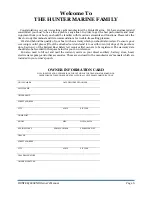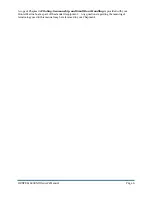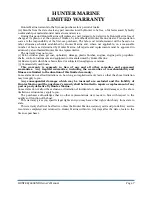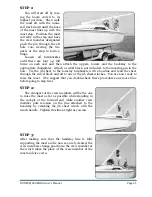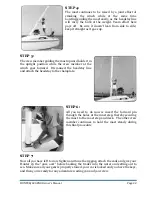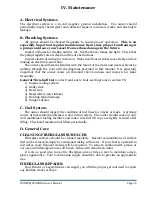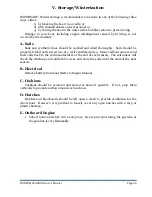
HUNTER/LEGEND Owner’s Manual
Page 11
FOR SAFE BOATING
BE PREPARED
Take a safe boating course from the Coast Guard. You can call 800-336-BOAT for
information on courses in your area.
Carry all safety equipment required by federal and state law. Federal requirements
are discussed in "Federal Requirements for Recreational Boats" which can be
acquired from U.S. Coast Guard Office of Boating, Public, and Consumer Affairs.
Washington. D.C. 20593. State requirements will come from your local State Boating
Administration. The Coast Guard also recommends a first-aid kit, a pump or bailer, a
transistor or weather radio, extra fuel, a paddle, anchor and line, and extra drinking
water, also, if not a requirement, flares.
Get a Coast Guard Auxiliary Courtesy Examination. This is a free, confidential
safety inspection. Call your local Coast Guard Auxiliary for details.
Be familiar with the use of distress signals and PFDs.
AVOID FIRES
Handle fuels carefully,
Read the engine owner's manual for proper fuel-system maintenance and inspect
your engine's fuel system periodically.
Heed fire extinguisher regulations and keep them in good condition.
While refueling:
a.
Fill the portable tanks on the dock.
b.
Tie the boat securely.
c.
Extinguish cigarettes and all flames on the boat. Turn off all engines and electrical
equipment.
d.
Keep the hose nozzle in contact with the fuel can or fill.
e.
Wipe up all fuel spillage.
f.
Ventilate the engine and fuel compartment.
g.
Check boat for fumes.
BEFORE GETTING UNDERWAY
Leave a float plan.
Perform pre-departure check list.
Check the weather; do not venture out if the weather is threatening.
WHILE UNDERWAY
PFDs should be worn by children and non-swimmers at all times. Everyone
should wear them if conditions become hazardous.
Do not operate a boat if intoxicated, fatigued or stressed. These human factors cause
50 percent of all boating accidents.
Keep a good lookout. This is especially true of sailboats. Keep a watch to leeward
under the headsail. Keep away from swimmers, divers and skiers.
Obey state and federal laws. Know your local laws and "rules of the road."
Respect bad weather: Try to get to shore if the weather turns bad. Get and carry a
radio with a NOAA "weather band" on FM 162.40-162.55 MHZ.
Summary of Contents for Hunter 23
Page 2: ...HUNTER LEGEND Owner s Manual Page 2...
Page 27: ...HUNTER LEGEND Owner s Manual Page 27 VI Specifications Technical Information...
Page 28: ...HUNTER LEGEND Owner s Manual Page 28...
Page 29: ...HUNTER LEGEND Owner s Manual Page 29...
Page 30: ...HUNTER LEGEND Owner s Manual Page 30...





